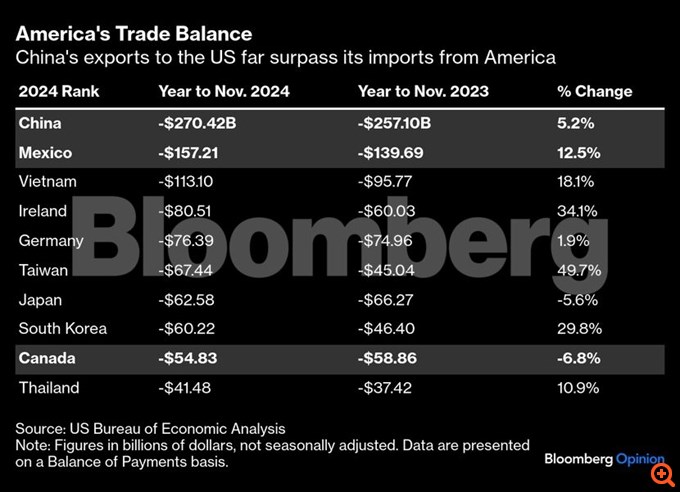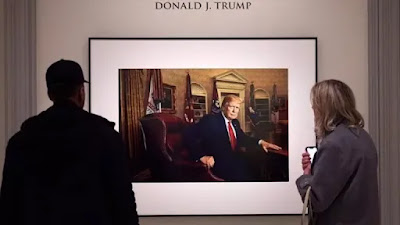Filenews 27 January 2025 - by Jonathan Levin
In Washington, there is a broad, bipartisan interest in addressing flawed U.S. trade relations with China, our main global rival for economic and military dominance.
So it's strange that President Donald Trump officially launched the international trade war of words this week by treating the world's second-largest economy "with a glove." What's even stranger is that Trump fired his first shots at Mexico and Canada, America's friends and neighbours.
Both countries have signed the United States-Mexico-Canada Trade Agreement, a "child" of Trump, which the president hailed as the "most fair, balanced and modern trade agreement ever reached." And while North America's trade deficits have risen since it took effect in 2020, partner countries had every intention of reviewing the deal in 2026 to address perceived weaknesses. Trump seems to have chosen them because they are convenient scapegoats who need the U.S. and are easily intimidated. Under Trump 1.0, a similar period of "Sturm und Drang" (Storm and Momentum) culminated in the trade deal — allowing him to fulfil a political promise to his supporters, even as he essentially simply upgraded and updated the North American Free Trade Agreement, or NAFTA. It's understandable that he may want to try a similar formula again, but he's playing with fire using the tactic a second time.

First, U.S. neighbours in North America are familiar with Trump's playbook. Canada has already drawn up a list of politically sensitive U.S. imports it could tariffs in response, and Bloomberg News reports that it includes products like Florida orange juice and Kentucky bourbon. The list that Mexico is probably compiling is certainly similar. These-for-tat gestures may seem at first glance to be of little importance, but the wider flow of trade is far from insignificant.
Canada and Mexico are America's two largest foreign markets, accounting for one-third of all U.S. exports. As my Bloomberg Opinion colleague Liam Denning has pointed out, the U.S. would have a trade surplus with Canada if it weren't for oil. Research into retaliatory tariffs during Trump's first term showed they led to lower U.S. export prices and volumes, lower manufacturing employment and fewer jobs, according to a recent report by Goldman Sachs. Since they typically target sectors where they can cause the most political or economic damage, Mexico and Canada could target U.S.-produced cars, agricultural and chemicals, among others.
The U.S. certainly has the most bargaining power, but exercising it this time will come at a greater political cost. When Trump forced the renegotiation of NAFTA in his first term, inflation was about 2 percent and 30-year mortgage rates were about 4 percent. Had he chosen to follow through on his exaggerated threats of 25 percent tariffs, U.S. consumers would undoubtedly have absorbed the blow.
In November, Trump was elected by an America tired of inflation. The consumer price index is up about 2.9% from last year and mortgage rates are still around 7%. As Trump and his negotiating partners know, voters would not take kindly to price increases for Mexican cars or supermarket products, or a price increase at the pumps resulting from tariffs on Canadian oil. Nor would they appreciate the continued upward pressure on mortgage rates that may result from signs of sticky inflation or a resurgence.
Exercising America's ability to hurt its neighbours economically would come at another cost. Crime and immigration were cornerstones of Trump's political agenda—even more so than trade—and Trump would risk undermining his own goals by driving neighbours into an economic slowdown or recession, especially Mexico. America's southern neighbour sends about 80 percent of its exports to the U.S., and an all-out trade war would boost the incentive for working-class Mexicans to seek work in America. At worst, it could even increase the number of drug cartel workers if the formal economy falters.
Finally, the United States risks alienating two great and important allies at a time when the world has become more dangerous, and we would do well to keep our friends on our side. This is generally beyond my remit as a market and finance columnist. But Hal Brands, a Bloomberg Opinion colleague and distinguished professor at the Johns Hopkins University School of Advanced International Studies, recently wrote that there is some logic behind the idea of reactivating U.S. leadership in the Americas. Brands says closer ties in trade, investment and security are "easy." The problem is that Trump rules with outrageous threats instead of diplomacy, damaging relations and undermining America's moral authority to resist intimidation from countries like Russia or China.
Even more confusing is why Trump appears to have downgraded China. (One theory: He's trying to play "good cop" for now, as he's pushing for a deal to move TikTok into American hands; I'll stick to that because I have no better idea.)
With Trump, tariffs seem to have emerged as his blunt tool for dealing with any problem — economic or otherwise. In some cases, Trump may indeed see an opportunity to raise revenue. In others, it may primarily intend to restrict trade flows to protect domestic industry. And in others, he may believe he is using tariff threats as leverage to persuade America's trading partners to lower their tariffs on us. But in the case of Mexico and Canada, it's not clear that it could achieve any of these things without causing significant collateral damage at home.
This leads to the conclusion that these are not really economic issues at all, but rather Trump's beliefs about immigration and the drug trade. "We're thinking in 25 percent terms about Mexico and Canada because they allow huge numbers of people" to cross the border, Trump told reporters Monday. In Brands' view, these may be complaints that are best dealt with collaboratively rather than fierce threats. But on trade and economic issues, it's hard to imagine how the U.S. will prosper from Trump's latest cowardice game with tariffs.
Performance – Editing: Lydia Roumpopoulou
